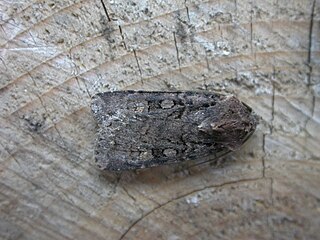
The garden dart is a moth of the family Noctuidae. It is distributed throughout much of the Palearctic. Temperate regions of Europe, Central Asia and North Asia, as well as the mountains of North Africa. Absent from polar regions, on Iceland and some Mediterranean islands, as well as in Macaronesia.

The large yellow underwing is a moth, the type species for the family Noctuidae. It is an abundant species throughout the Palearctic realm, one of the most common and most familiar moths of the region. In some years the species is highly migratory with large numbers appearing suddenly in marginal parts of the range.

The common Quaker is a moth of the family Noctuidae first described by Johan Christian Fabricius in 1775. Some authors prefer the synonym Orthosia stabilis(Denis & Schiffermüller, 1775). It is distributed throughout Europe and is also found in Turkey, Israel, Transcaucasia, Russia and eastern Siberia.

Apamea crenata, known as the clouded-bordered brindle, is a moth in the family Noctuidae. It is distributed throughout the Palearctic realm. In the North it crosses the Arctic Circle, in the Mediterranean it is found only in cool locations and mountains avoiding very hot areas. In the Alps, it rises to an altitude of about 2000 metres.

Orthosia populeti, the lead-coloured drab, is a moth of the family Noctuidae. It is found in Europe.

Protodeltote pygarga, the marbled white spot, is a species of moth of the family Noctuidae. It is found in the Palearctic realm.
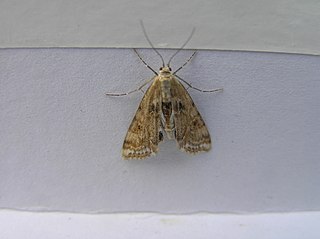
Cataclysta lemnata, the small china-mark, is a moth species of the family Crambidae. It is found in Europe, Morocco and Iran.

Agonopterix arenella is a species of moth of the family Depressariidae. It is found in all of Europe, except the Iberian Peninsula.
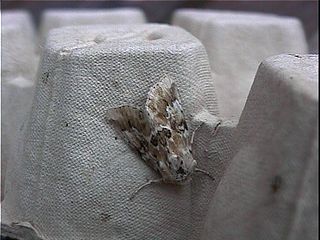
The Dusky Sallow is a moth of the family Noctuidae. It is found in Central and Southern Europe and the Middle East.

Mesapamea secalis, the common rustic, is a moth of the family Noctuidae. The species was first described by Carl Linnaeus in his 1758 10th edition of Systema Naturae. It is found in Europe, north-west Africa, Turkey and northern Iran.

Lygephila craccae, the scarce blackneck, is a moth of the family Erebidae. It is found in temperate Europe and across the Palearctic to the Altai Mountains, Korea, Japan and China.

Agrotis trux, the crescent dart, is a moth of the family Noctuidae. The species was first described by Jacob Hübner in 1824. It has a circum-Mediterranean distribution and is found along the coasts of France, Ireland, England, southern Europe, Algeria, Syria, Iraq, Iran, southern Russia and the Arabian Peninsula. In Africa, it is found as far south as South Africa.

Spaelotis ravida, the stout dart, is a moth of the family Noctuidae. The species was first described by Michael Denis and Ignaz Schiffermüller in 1775. It is found in the Palearctic realm.
Xyroptila peltastes is a moth of the family Pterophoridae. It is found in Australia.
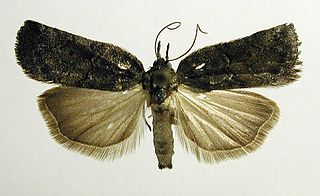
Nycteola revayana, the oak nycteoline, is a moth of the family Nolidae. The species was first described by Giovanni Antonio Scopoli in 1772. It is found from Europe and east across the Palearctic to Japan and India.
Acrocercops lophonota is a moth of the family Gracillariidae. It is known from Java, Indonesia.
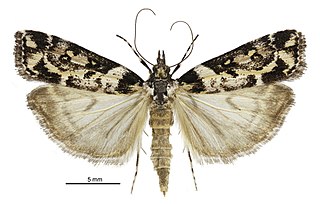
Eudonia diphtheralis is a species of moth in the family Crambidae. It is endemic to New Zealand.

Scrobipalpa atriplicella, the goosefoot groundling moth, is a moth of the family Gelechiidae. It is found from most of Europe throughout Asia to Kamchatka and Japan. It is an introduced species in North America.
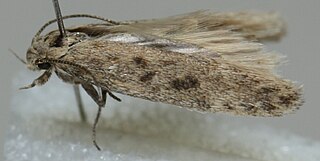
Scrobipalpa obsoletella, the summer groundling, is a moth of the family Gelechiidae. It is found in most of Europe, Turkey, the Caucasus, from Iran to Asian Russia (Transbaikal) and Mongolia. It has also been recorded from South Africa and North America, where it is probably an introduced species. The habitat consists of coastal salt marshes and sandy beaches.
Stenoma recondita is a species of moth of the family Depressariidae. It is found in Guyana.



















